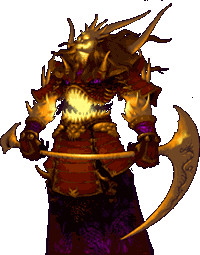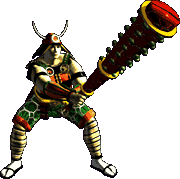|
|

|
page 1/3
|

There is a legend in Japan that dates back to the Age of Kami1. It is a legend that is rarely spoken of, and even then,
in furtive whispers and never in the dark. The legend tells of the Decline of the Kami brought on by the Lord of Evil and Demon of
Destruction, Maou-Hakaiki Zanshin 2 and the heroes who fought against the darkness.
The legend begins with the ascension of Shogun Kira Tsunayoshi, great grandson of Kira Bennosuke, as
Supreme Warlord of Yamato.
Fifty years before, when Bennosuke had risen to power and became the Shogun, he had commissioned five
castles. One was built on the sacred mountain of Shourinzan3 , to honor those that gave their lives for him,
and to appease the souls of the vanquished. The other four were built around the mountain in line with the
cardinal directions, each honoring one of the four gods who had aided his rise to power. Bennosuke awarded
four of his most capable and loyal retainers the four lower castles to act as both guardians for the shrines and
as protectors of the kingdom.
Bennosuke ruled Yamato with a fair and just hand. The four deities, Susano-no-mikoto, God of the Sea and Storms,
Amaterasu-oo-mikami, Goddess of Sun, O-Kuni-nushi, God of the Land and Raiden, God of Lightning, were given the
place of Official Deities of Yamato. Daily obeiscances were made to the four Gods and certain days of the year were
set aside for them.
 As time passed, the people gradually forgot the days of strife and grief from war. Trade flourished, there was plenty
to eat, and there was always something new and interesting to entertain one's self. Yet in time, the people grew soft,
and their faith wavered.
As time passed, the people gradually forgot the days of strife and grief from war. Trade flourished, there was plenty
to eat, and there was always something new and interesting to entertain one's self. Yet in time, the people grew soft,
and their faith wavered.
Bennosuke passed away and he was succeeded by Kira Tsunayoshi. Tsunayoshi was a wretched statesman and a
pathetic leader. The responsibility of running the kingdom was left to the four Daimyos, while Tsunayoshi amused himself.
From parading his troops up and down the mountainside "just to see their banners flapping in the breeze," to
throwing week-long banquets of extraordinary decadence, Tsunayoshi led an extravagant and shallow life.
The people too, spurned on by the acts of their ruler, shared Tsunayoshi's decadent lifestyle. Normal life no longer
seemed to have the same allure it once had. Wars were a thing of the past and it was now time to live life to its fullest.
Money became the new god as Yamato grew affluent under the rule of the four Daimyo. The people stopped caring about
the four gods who had helped them in their time of need and began worshiping newer, more sinister gods, which seemed
to fit their life style.
 But the Gods were not without their divine punishment; both for the hubris of Tsunayoshi, and the loss of reverence
from the people. Tsunayoshi awoke one morning with the terrible knowledge that he was dying, as the Gods had
whispered in his dreams that they would visit him every night to carve a sliver of his soul away until he was nothing
but a simple doll of flesh. This, they said, was his punishment for both the excesses of his people, and himself. But the
Shogun did not relent in his behavior. He sent a proclamation through the kingdom demanding that anyone who could
save his life to come do so. Many came, but none could deliver their promise. Each failure resulted in an execution, each
more terrible then the last. Rumors began to surface, about dark and evil ceremonies the Shogun practiced. How he would
bring young children into his castle and they would never be seen again. How entire villages sometimes disappeared, and for
weeks afterward muffled wails could be heard from the castle walls. Tsunayoshi then began to send agents throughout the
kingdom to bring people to him that could save him.
But the Gods were not without their divine punishment; both for the hubris of Tsunayoshi, and the loss of reverence
from the people. Tsunayoshi awoke one morning with the terrible knowledge that he was dying, as the Gods had
whispered in his dreams that they would visit him every night to carve a sliver of his soul away until he was nothing
but a simple doll of flesh. This, they said, was his punishment for both the excesses of his people, and himself. But the
Shogun did not relent in his behavior. He sent a proclamation through the kingdom demanding that anyone who could
save his life to come do so. Many came, but none could deliver their promise. Each failure resulted in an execution, each
more terrible then the last. Rumors began to surface, about dark and evil ceremonies the Shogun practiced. How he would
bring young children into his castle and they would never be seen again. How entire villages sometimes disappeared, and for
weeks afterward muffled wails could be heard from the castle walls. Tsunayoshi then began to send agents throughout the
kingdom to bring people to him that could save him.
Then one day, a Monk came to the castle gates demanding to see the Shogun, claiming he had an elixir of immortality. The
Monk was a small, shriveled man dressed in the simple garb of a Buddhist priest. Painfully thin arms clutched a bamboo staff
that produced an odd staccato counterpoint to his crab like gait as he shuffled across the pavement. He was quickly shown
to the bedside of the Tsunayoshi, where the Monk gave a draught of exceeding bitterness to the Shogun. Within minutes, the
Shogun rose from the bed, fully rejuvenated, and bellowed for the servants to bring him sake 4 . That night the
Shogun and the Monk drank a prodigious amount of alcohol with the ruler. What passed between the two is unknown, but it
has been surmised that the Monk kindled the fire of conquest and glory in the Shogun.
|


